- Home
- Conn Iggulden
The Falcon of Sparta
The Falcon of Sparta Read online
Conn Iggulden
* * *
THE FALCON OF SPARTA
Contents
Map
Prologue
Part One
Chapter 1
Chapter 2
Chapter 3
Chapter 4
Chapter 5
Chapter 6
Chapter 7
Chapter 8
Chapter 9
Chapter 10
Chapter 11
Chapter 12
Chapter 13
Chapter 14
Chapter 15
Chapter 16
Chapter 17
Chapter 18
Chapter 19
Part Two
Chapter 20
Chapter 21
Chapter 22
Chapter 23
Chapter 24
Chapter 25
Chapter 26
Chapter 27
Chapter 28
Chapter 29
Chapter 30
Chapter 31
Historical Note
Follow Penguin
Also by Conn Iggulden
Dunstan
THE WARS OF THE ROSES SERIES
Stormbird
Trinity
Bloodline
Ravenspur
THE EMPEROR SERIES
The Gates of Rome
The Death of Kings
The Field of Swords
The Gods of War
The Blood of Gods
THE CONQUEROR SERIES
Wolf of the Plains
Lords of the Bow
Bones of the Hills
Empire of Silver
Conqueror
Blackwater
Quantum of Tweed
BY C. F. IGGULDEN
EMPIRE OF SALT SERIES
Darien
BY CONN IGGULDEN AND HAL IGGULDEN
The Dangerous Book for Boys
The Pocket Dangerous Book for Boys: Things to Do
The Pocket Dangerous Book for Boys: Things to Know
The Dangerous Book for Boys Yearbook
BY CONN IGGULDEN AND DAVID IGGULDEN
The Dangerous Book of Heroes
BY CONN IGGULDEN AND
ILLUSTRATED BY LIZZY DUNCAN
Tollins: Explosive Tales for Children
Tollins 2: Dynamite Tales
To my son Cameron,
who came with me to Sparta.
In 401 BC, the Persian king ruled an empire from the Aegean to northern India. As many as fifty million people were his subjects – and his armies were vast.
Working together on land and sea, only Sparta and Athens ever turned them back.
Prologue
In Babylon, starlings gaped in the heat, showing dark tongues. Beyond vast city walls, the sun leaned on those who laboured in the fields, pressing them down.
As he walked in the middle of the road, the Great King bore a sheen on his skin, of oil or sweat his son could not have said. His father’s beard gleamed in tight black curls, as much a part of him as the odour of roses, or the long panelled coat he wore.
The air smelled of hot stone and cypress trees, like spearheads against the sky. The streets all around had been emptied of those who lived there. Not a child, not an old woman, not a chicken had been left to scratch the earth as the imperial soldiers had cleared a way for the king to walk. The silence lay so heavy, the boy could hear birdsong.
The street of Ningal had been laid with soft palm branches, thick underfoot and still green. No foul odours would interrupt their conversation or distract the older man from this moment of instruction. His purpose was the very survival of his house, and he had allowed neither courtesans nor spies to stand close enough to hear. His captains thought it was a royal whim that had sent them out to clear the districts on either side, long before the sun rose that morning. The truth was that some words could not be overheard. The king knew there were many listeners in his court. There were just too many small satraps, too many kingdoms whose crowns he had crushed beneath his sandals. Ninety rulers paid their spies to listen, while a thousand courtiers jostled for position. The simple pleasure of walking alone with his son, as any shepherd might have done, had become a luxury as great as rubies, as valuable as the thick gold coins they called ‘archers’ that bore the likeness of King Darius across the empire.
As they walked, the little boy stole sideways glances at his father, adoring and trusting him in all things. Young Artaxerxes matched his gait to the king’s, though it meant he had to add half a pace every once in a while, skipping to keep up. Darius appeared not to notice, though Artaxerxes knew his father missed very little of anything. The secret of his long reign lay in his wisdom. If the little boy’s opinion had ever been sought, he would have said his father had never been wrong.
On court days, the king sat in judgement on his most powerful lords, on men whose armies ran to tens of thousands, who ruled lands of jade and ivory about as far off as the moon. Darius would listen and run a hand down his beard, picking up a shine on his fingers. He would rub thumb and forefinger together, or take a grape from a golden bowl held by a slave kneeling at his feet. In such a way, Darius saw through to the heart of a problem while his advisers were still weighing and arguing. Artaxerxes wanted that extraordinary insight, so he listened, and learned well.
The city was as still as only thousands of soldiers holding knives to throats could make it still. The king’s generals knew his wrath would fall on their heads if they disturbed him – and so father and son walked as if they were the only two alive in the world, with dust and warmth and the sun setting, bringing them ease after the heat of the day.
‘Babylon was the heart of an empire once, a great one,’ King Darius said. His voice was gentle, more that of a teacher than a warrior.
His son looked up, his eyes bright.
‘Though Persia is greater,’ Artaxerxes said.
His father smiled at his pride.
‘Of course! In all ways. Persia is a dozen times larger than old Babylon’s ambitions. The borders of my empire cannot be walked in a lifetime – or two, three. Yet it was not given to me, boy. When my father was killed, the crown fell to my brother. He took it before the tears had dried on his face – and ruled for just a month before he was murdered.’
‘And you took vengeance on the one who killed him,’ Artaxerxes said, wanting to please.
The king stopped and turned his face to the sun, closing his eyes the better to see the memories.
‘I did. As the sun rose that day, there were three of us, three brothers. That evening, I was alone. I was spattered in blood – but I was king.’
Darius filled his chest, making the panels of his coat creak over the fine silks beneath. His son straightened in conscious mimicry. Artaxerxes did not know why his father had called him to his side that day, nor why even the famous Immortal guards were out of sight. His father trusted no one, so it was said, yet he walked alone with his oldest son and heir. At fourteen years of age, it made Artaxerxes light with pride and happiness.
‘A king needs more than one son,’ his father went on. ‘Death comes all too quickly, as a desert wind can rise without warning. It can reach out as a horse stumbles or a knife slips. It can come from poison or treachery, from spoiled meat, from fevers and djinns of the air. In such a world, a king with just one son is a challenge to the gods, as well as all his enemies.’
Darius walked on, clasping his hands behind his back and making the boy scramble to keep up. As Artaxerxes drew abreast, his father continued.
‘Yet if that first son, that most beloved boy, survives to become a man, a different game begins. If he has brothers then, so vital in the years gone by, they are the only ones in the
world who can take it all from him.’
‘Cyrus?’ Artaxerxes said suddenly. Despite his caution, despite his awe for his father, the idea that his little brother could ever be his enemy made his eyes sparkle in amusement. ‘Father, Cyrus would never hurt me.’
His father spun on the spot. The panels of his coat rose like the carapace of a beetle about to fly.
‘You are my son and my heir. If you are taken, Cyrus will be king. That is his … purpose.’ The king went down onto one knee and clasped the boy’s hands in his. ‘You will wear my crown, I promise you. But Cyrus … is a born warrior. He is only thirteen, but he rides as well as my own guard. You have seen how they look to him? Only last month, they carried him round the palace yard on their shoulders when he shot a bird in flight with his bow.’ The king took a deep breath, wanting Artaxerxes to understand. ‘My son, I love you both, but when I am on my last bed, when the empire is hushed and in mourning, on that final day, I will call him home – and you will have to kill him. Because if you leave him alive after that, he will surely kill you.’
Artaxerxes saw tears come into his father’s eyes, sparkling there. It was the first time he had ever seen such a display of emotion, and it shook him.
‘I think you are mistaken, Father, but I will remember what you have said.’
The king rose to his feet, his coat creaking. He had grown flushed, though whether it was anger or some other emotion was hard to say.
‘Then remember this as well,’ he snapped. ‘If you say one word of this to Cyrus, anything at all of what I have gone to such lengths to keep private, you will be cutting your own throat. Not today or this year, of course, while you laugh and play together. He will promise you his loyalty and I do not doubt he will mean it with all his heart. Then a day will come when you fall out, or when he sees he will never have the authority he wants, not as a mere prince. On that day, he will come to you and take the throne for himself. And if I am alive on that day, if he comes to me after, even if he has your blood on his hands … even then, I will have no other son and so I will embrace him. Do you understand, Artaxerxes?’
‘I do,’ his son said, his own anger swelling. ‘Yet if you admire him so much, Father, why not just kill me here in the road and let Cyrus take the throne?’ Before his father could reply, Artaxerxes went on: ‘Because you have no other sons and you would risk the succession. You are truly so cold? It does not matter to you which of us is king?’
‘If it did not matter to me, I would not have cleared half a city to walk in private with you. Do you see Cyrus here? You were the child we longed for, my brave boy. I do not doubt your intelligence, your wisdom, Artaxerxes. You have my blood in you and you will make a great king.’
Darius reached out and touched his son’s cheek.
‘I saw my father broken when he came home from Greece. King Xerxes had beaten the Spartans at Thermopylae, but then his armies were routed at Plataea. Just as his father’s had been cut to pieces at Marathon ten years before. Well, no more! I vowed it when I became king. We have left enough of our blood in Greece, enough for a thousand years. Instead of war, my reign preserved peace – and brought us gardens and wine and gold and extraordinary learning. There are things made common today that would be sorcery in any other age. With you, we will go further – the greatest empire the world has ever known. If it is you. If the gods put Cyrus on that throne, he will wage war once again, I do not doubt. He is too much my father, too much his father.’
‘I can fight, you know,’ Artaxerxes said, stung. ‘I know you don’t think of me in that way, but I can.’
The king laughed and clapped him on the back. He loved his son too much to hurt him by disagreeing.
‘Of course. Though any moneylender’s guard can fight. You are a prince, Artaxerxes! You will be a king. So you need more than a quick smile and quicker sword. You need strength of a different kind. Beginning today. You are not too young for this.’
The king looked around them at the empty street. Not a face peered from a single window.
‘Remember. On the day you are king, you must make an end. Until then, learn from your tutors, ride horses, enjoy the pleasures of women, boys and red wine. Do not speak of this day to anyone. Do you understand me?’
‘I do, Father,’ Artaxerxes said.
His serious face made the king smile, his entire bearing changing, so that he reached out and ruffled the hair of his son.
‘I am a thousand times blessed.’
Part One
* * *
1
The mountain cradled the city like a mother with a child in her lap. Before climbing the steps to the great plateau, Cyrus decided to lead his personal guard to the river. The Spartans left their armour and weapons on the bank and charged into the water, gleefully washing away the dust and sweat of four hundred miles.
From the height of his warhorse, the prince smiled to see them splashing and running fingers through their hair and beards. The march east had made his men lean, like hunting dogs, darkening their skin and pulling taut the cords of their muscles. They had not faltered, though some of them had left prints of blood on the road.
‘My lord, will you not change your mind?’ Tissaphernes said softly.
Cyrus glanced over at his old friend and tutor. Tissaphernes sat a chestnut gelding that snorted and tossed its head, of a bloodline as fine as any in Persia. The nobleman kept his gaze on the Spartans, his expression sour.
‘Should I climb the steps alone?’ Cyrus replied. ‘Should I come home like a beggar? Who am I, if not my father’s son and a prince? These are my guards. They are the best.’
Tissaphernes worked his mouth as if a tooth bothered him. Prince Cyrus was in his twenties and no longer young and foolish. The tutor had made his reservations clear, and yet there they were on the banks of the river Pulvar, with men of Sparta washing like horses in the water, throwing up spray. The prince had brought an old enemy to the very eye of Persia. Tissaphernes frowned at the thought. He had seen Greek maps of the world that knew little of the great empire of the east. He had no desire to help Spartans fill in the location of Persepolis, still less the royal tombs along the river, just half a day’s march away.
‘Some might see it as an insult, Highness, to bring the very men who faced your ancestors, who denied them on land and sea. Spartans! By the deva spirits. Here, in the heart of the world! If your father was a younger man and well …’
‘He would congratulate me, Tissaphernes,’ Cyrus snapped, wearying of his voice. ‘These men have run at my side. They did not falter or ask for rest. They are loyal to me.’
‘They are loyal to gold and silver,’ Tissaphernes muttered under his breath.
Cyrus clenched his jaw, so that the muscles stood out.
‘They own nothing. Even their weapons come down from the hands of their fathers and uncles, or are given to them for acts of valour. Enough of this. No more now, old lion.’
Tissaphernes accepted the rebuke, bowing his head.
The Greeks had been brisk at their ablutions, coming out quickly to stand on the banks and dry in the evening sun. Local washerwomen hooted and called at the sight of so many naked men. One or two of the warriors smiled in return, while others loosened up with exercises. They were not made for laughter or light talk.
Irritated with his companion, Cyrus suddenly dismounted, stripping off his helmet, his tunic and armoured coat, his leggings and cloak, then removing his sandals, all with neat economy of movement. The prince was untroubled by nudity and strolled into the water with just a nod to the Spartan officer, Anaxis, who watched from the bank.
The washerwomen ceased their calls at the sight of a young man who wore his beard curled like a Persian and left a helmet marked with feathers of gold on his cloak. They may not have known his name, but they did not dare call out to him. Cyrus washed himself in the waters with slow care, almost as a ritual, a cleansing of more than sweat and the smell of horses. The Spartans on the bank were silent, showing respect.
The prince had come home to mourn his father, after all.
The message had reached Cyrus fourteen days before and he had pushed the Spartans almost beyond endurance to be there in time. The prince had changed horses at crown taverns on the great Royal Road, or cut across country through tilled fields of wheat and barley, yet they had kept pace, loping along at his side day after day, as if it was nothing. They were extraordinary, and he was proud of their red cloaks and the reaction of others when they discovered who they were. The reputation had been earned, over and over again.
In that place, with the cool of evening upon them, Cyrus took heart. The city of Persepolis seemed subdued, but not in the public throes of grief. The streets were not lined with soldiers, nor draped in mourning cloths, with pots of sandalwood burning. Yet until he passed through the gates of the plateau above the city, he could not be sure the old man still lived. He turned at the thought, looking up at the mountain his father and grandfather had remade, to the imperial plain that was a line of green and grey at such a distance. Wild falcons circled lazily above it in the warm air, watching for fat pigeons in the fruit trees. That royal terrace contained palaces, barracks, theatres and libraries. His father’s pavilion would lie at the centre of the lush garden they called a ‘paradise’, the secret green heart of an empire.
On the river banks, low bushes clung, their roots worn into smooth sculpture. White flowers of jasmine showed on trailing vines, filling the air with scent. The prince breathed deeply, standing waist-deep in the waters with his eyes closed. He was home.
The Spartans dried quickly as they patted themselves down with their cloaks and ran fingers through their hair, made cool despite the sun. The prince too was refreshed, dressing once more with care. He strapped on the armoured coat over his tunic, but also bronze Spartan greaves onto his shins, perfectly shaped to him so that the muscles and the curve of his kneecaps were marked in the polished metal. They were more use to those who stood with shields than those who rode, but Cyrus liked to honour his men in such a way. Tissaphernes thought it a foreign affectation and beneath him, of course.

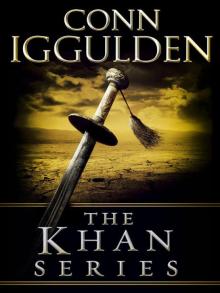 The Khan Series 5-Book Bundle
The Khan Series 5-Book Bundle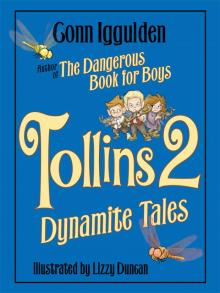 Tollins 2: Dynamite Tales
Tollins 2: Dynamite Tales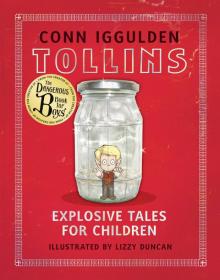 Tollins: Explosive Tales for Children
Tollins: Explosive Tales for Children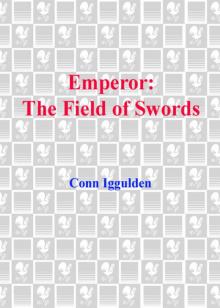 The Field of Swords
The Field of Swords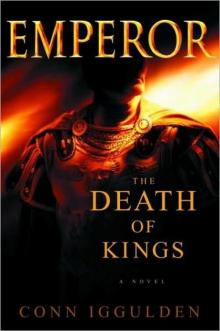 The Death of Kings
The Death of Kings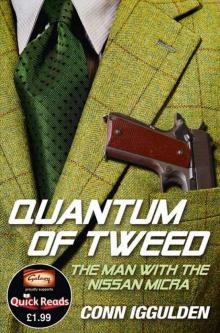 Quantum of Tweed: The Man With the Nissan Micra
Quantum of Tweed: The Man With the Nissan Micra Bones of the Hills
Bones of the Hills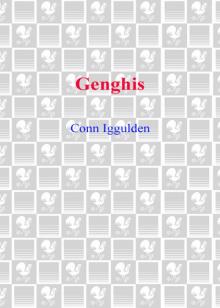 Genghis: Birth of an Empire
Genghis: Birth of an Empire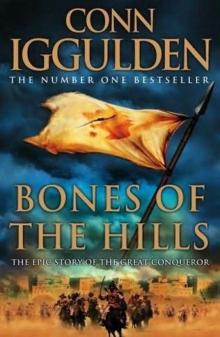 The Gates of Rome
The Gates of Rome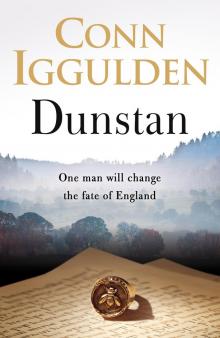 Dunstan
Dunstan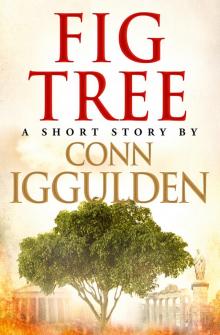 Fig Tree
Fig Tree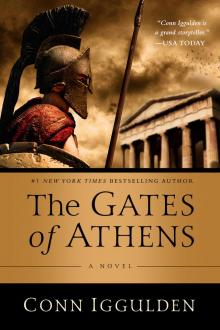 The Gates of Athens
The Gates of Athens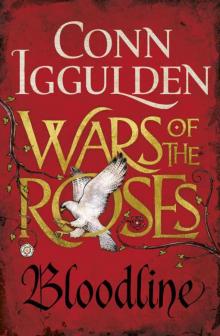 Stormbird
Stormbird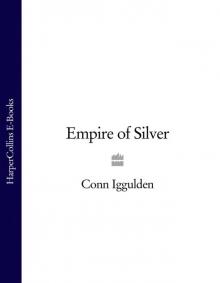 Khan: Empire of Silver
Khan: Empire of Silver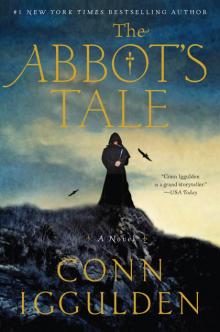 The Abbot's Tale
The Abbot's Tale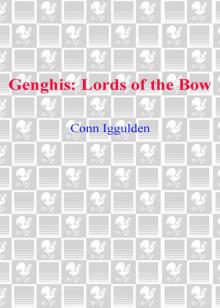 Gengis: Lords of the Bow
Gengis: Lords of the Bow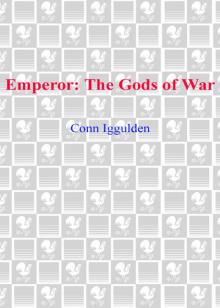 The Gods of War
The Gods of War Blackwater
Blackwater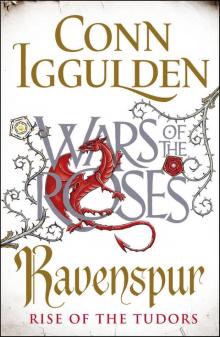 Ravenspur: Rise of the Tudors
Ravenspur: Rise of the Tudors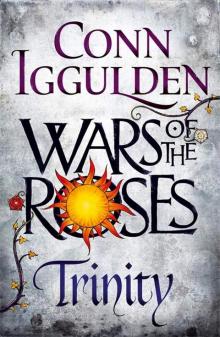 Wars of the Roses: Trinity (War of the Roses Book 2)
Wars of the Roses: Trinity (War of the Roses Book 2)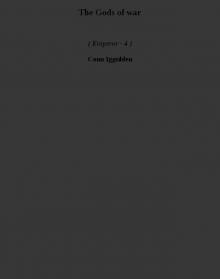 The Gods of war e-4
The Gods of war e-4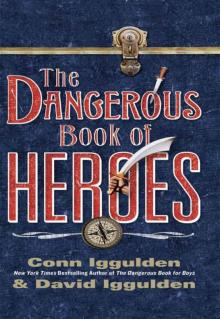 The Dangerous Book of Heroes
The Dangerous Book of Heroes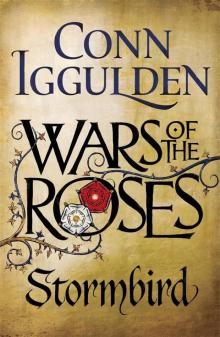 Stormbird wotr-1
Stormbird wotr-1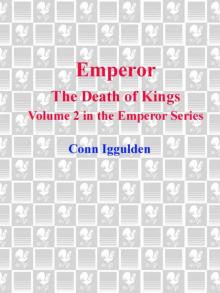 Emperor: The Death of Kings
Emperor: The Death of Kings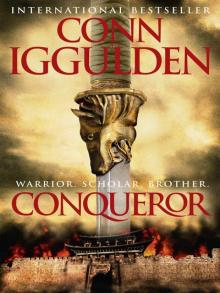 Conqueror (2011) c-5
Conqueror (2011) c-5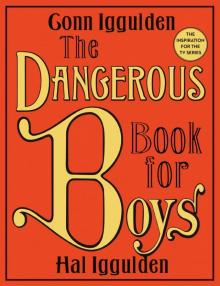 The Dangerous Book for Boys
The Dangerous Book for Boys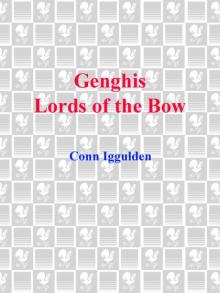 Genghis Lords of the Bow
Genghis Lords of the Bow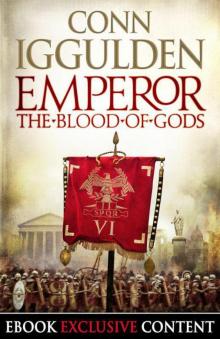 Emperor: The Blood of Gods (Special Edition) (Emperor Series, Book 5)
Emperor: The Blood of Gods (Special Edition) (Emperor Series, Book 5)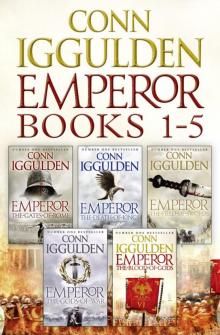 The Emperor Series: Books 1-5
The Emperor Series: Books 1-5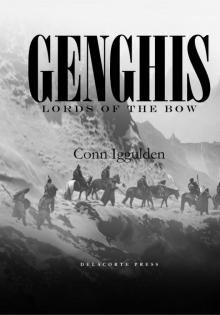 Lords of the Bow c-2
Lords of the Bow c-2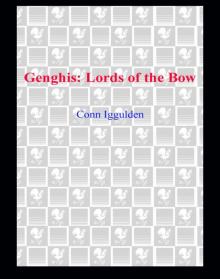 Lords of the Bow
Lords of the Bow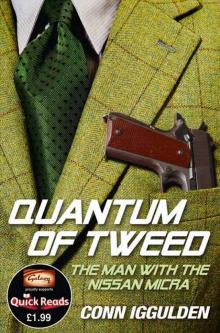 Quantum of Tweed
Quantum of Tweed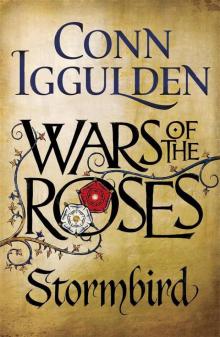 Wars of the Roses 01 - Stormbird
Wars of the Roses 01 - Stormbird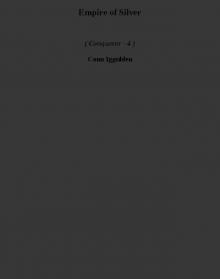 Empire of Silver c-4
Empire of Silver c-4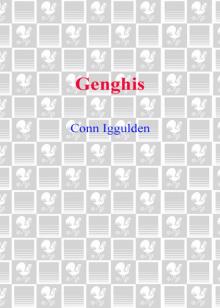 Birth of an Empire
Birth of an Empire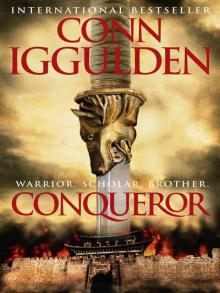 Conqueror (2011)
Conqueror (2011)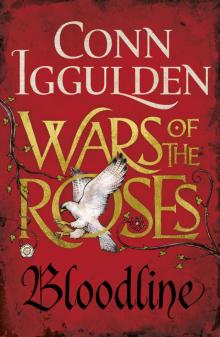 Wars of the Roses: Bloodline: Book 3 (The Wars of the Roses)
Wars of the Roses: Bloodline: Book 3 (The Wars of the Roses) Bones Of the Hills c-3
Bones Of the Hills c-3 Empire of Silver
Empire of Silver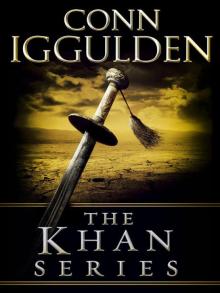 The Khan Series 5-Book Bundle: Genghis: Birth of an Empire, Genghis: Bones of the Hills, Genghis: Lords of the Bow, Khan: Empire of Silver, Conqueror
The Khan Series 5-Book Bundle: Genghis: Birth of an Empire, Genghis: Bones of the Hills, Genghis: Lords of the Bow, Khan: Empire of Silver, Conqueror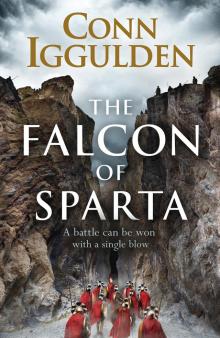 The Falcon of Sparta
The Falcon of Sparta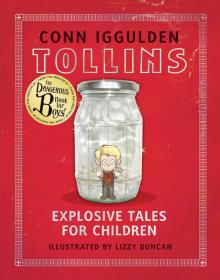 Explosive Tales for Children
Explosive Tales for Children